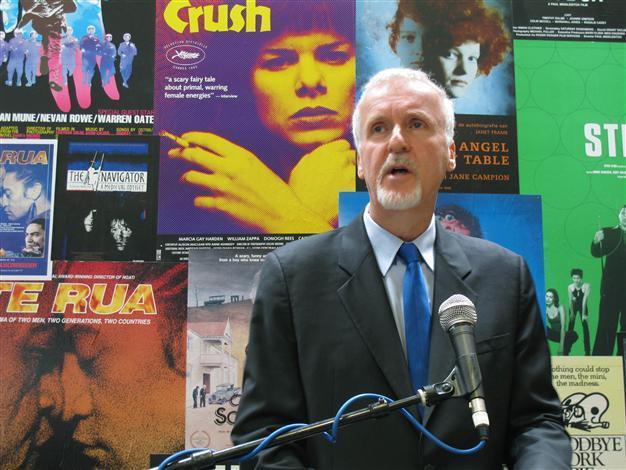Cameron to film three Avatar sequels in New Zealand
WELLINGTON - Agence France-Presse

Director James Cameron announces on Monday, Dec. 16, 2013, in Wellington, New Zealand, that he will shoot three sequels to his 2009 sci-fi blockbuster movie "Avatar" in New Zealand. AP Photo
Director James Cameron announced Monday he will film three sequels to the record-breaking sci-fi epic "Avatar" in New Zealand after striking a deal with the government for increased production subsidies.
Cameron said the movies, with a combined minimum budget of at least NZ$500 million (US$415 million), will be shot back-to-back and released once every 12 months from late 2016.
The original "Avatar" was partially shot in New Zealand and its Oscar-winning special effects were created by Wellington's Weta Digital, best known for its work on Kiwi director Peter Jackson's "The Lord of the Rings" and "The Hobbit" trilogies.
"It's quite a thrill to officially say that we'll be bringing the Avatar films to New Zealand," Cameron told reporters.
Aside from an increased subsidy that will account for up to 25 percent of the films' budget, Cameron said New Zealand offered highly skilled production crews and world-class special effects.
"I've worked with crews all over the world, quite a bit in the US and Canada, and you don't have that same spark (there)," he said.
"Avatar", which tells the story of a blue-skinned indigenous species fighting to stop miners exploiting their planet Pandora, earned US$2.78 billion worldwide and remains the highest-grossing movie of all time, according to industry website boxofficemojo.com.
Prime Minister John Key said securing the sequels was a coup that "will scream out to the world that New Zealand is a great place to make movies".
"We've got to be a lot more as a country than just lamb chops and All Blacks," he said, referring to two of the country's best-known symbols. "That's what the movie industry does, it demonstrates to the world that there's more to us." There were fears late last year that New Zealand would lose the deal, with the government reluctant to lift its screen production rebate from 15 to 25 percent to match the sweeteners available in countries such as Britain and Australia.
Key faced criticism in 2010 when he changed New Zealand's industrial relations laws to ensure "The Hobbit" trilogy stayed in the country, a move he said had created about 5,500 jobs.
He denied the "Avatar" deal was another example of Hollywood forcing concessions out of his government, saying "there will always be people who want to look at this as a glass half empty situation".
For all the technical skills available in New Zealand, Cameron said he and 20th Century Fox would have had to look elsewhere if the government had not offered increased subsidies.
"Business sense would have had to prevail and I'm glad that it never came to that," he said.
Cameron -- whose other hits include "Titanic", "Terminator" and "Aliens" -- refused to reveal how much he thought the three films would cost to make but said he hoped it would be less US$1.0 billion.
The Canadian-born director, who owns a rural property just outside Wellington and is in the process of obtaining New Zealand residency with his family, said pre-production work had already begun.
He said the sequels may employ the 48-frame a second technology -- twice the standard rate -- that Jackson used to mixed reviews in "The Hobbit".
"I might just use it in selected scenes, such as when the camera's panning, aerial vistas and that sort of thing," he said.
